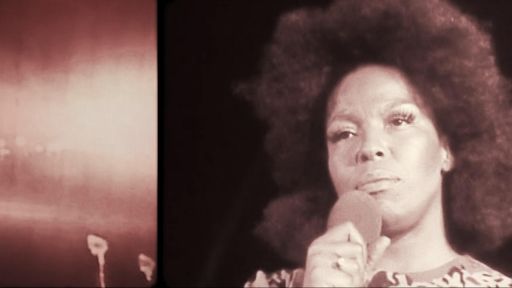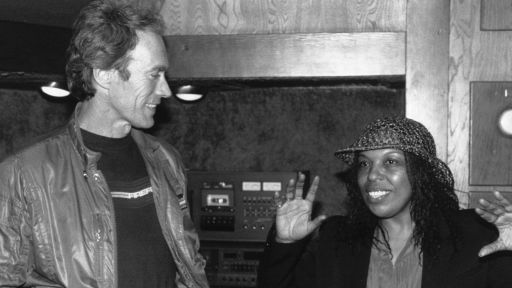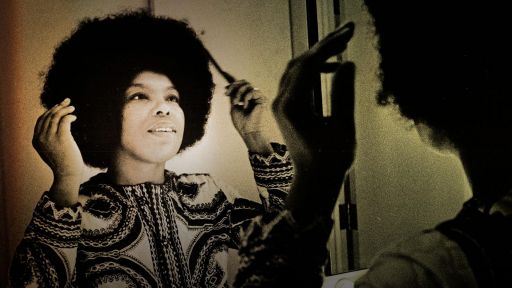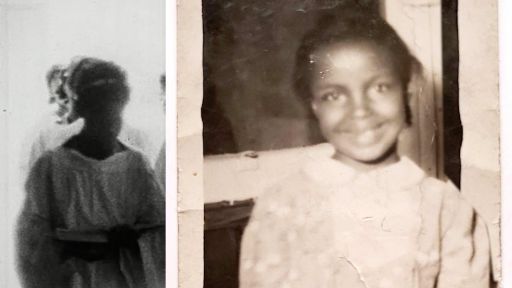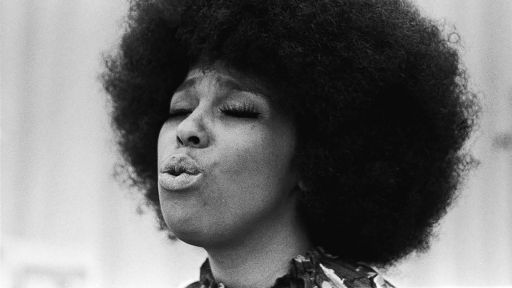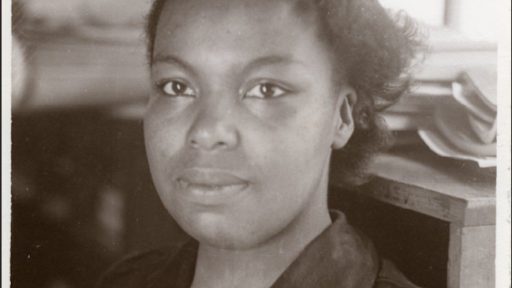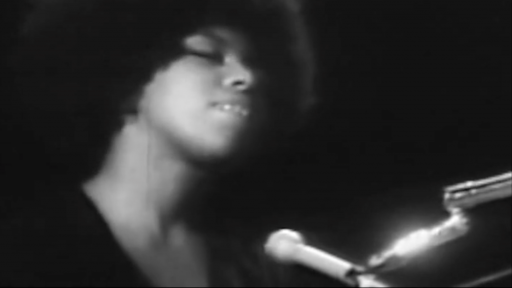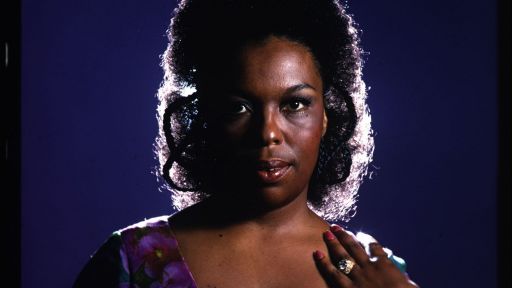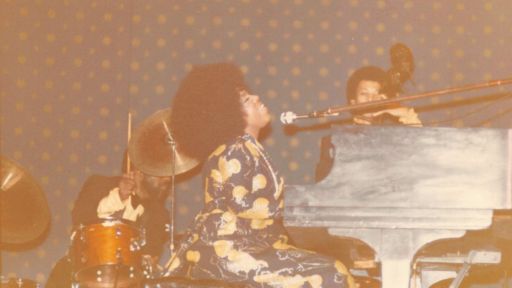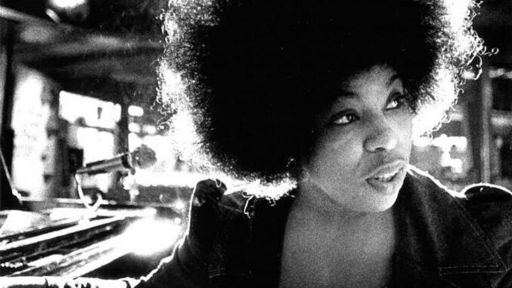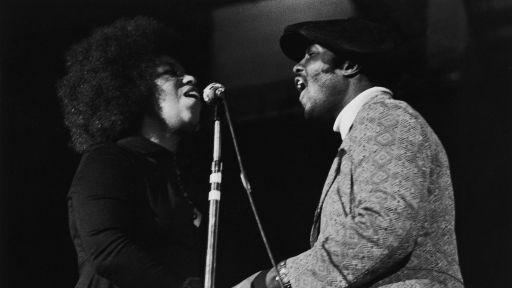TRANSCRIPT
♪♪ [ Cheers and applause ] [ Drumming ] -♪ People always talkin' ♪ ♪ About man's inhumanity to man ♪ ♪ What you tryin' to do ♪ ♪ To make this a better land?
♪ ♪ Just pick up your paper ♪ ♪ Turn on your TV ♪ ♪ You see a lot of demonstrations ♪ ♪ For equality ♪ ♪ Folks wouldn't have to suffer ♪ ♪ If there was more love, more love, more love ♪ ♪ These are tryin' times, Try... ♪ In 1968, I had worked as a singer at a little club on Capitol Hill where a lot of senators came with their families on Sundays, and it was also a gay bar, and it was, like, very cosmopolitan, kind of interesting place.
I met people that I had never met before.
I got a chance to do my first national television show out of that club.
♪ Yeah, yeah, yeah ♪ The transition to the stage was a smooth one for me personally.
♪ The whole thing ♪ -Did you want to be a music teacher, or did you dream of stardom then?
-I always dreamed of stardom.
[ Piano playing ] [ Applause ] ♪ Ow!
♪ -We just heard a selection performed by the full orchestra, but there's one vital instrument that I left out -- the voice, in this instance, a very beautiful voice.
-It's a story.
[ Applause ] It ain't a story you think it is.
-The last time I was in Washington, D.C., I heard a lady sing, probably one of the greatest singers today, -A woman who went from being a schoolteacher to being recognized as one of the top performers in the world.
-Whose music for years has been making people laugh and cry, sometimes at the same time.
-A singer, Roberta Flack.
-Roberta Flack.
-♪ Was early Sunday ♪ -I'll never forget the first time I ever saw that face.
She was accepting a Grammy Award on television, having already become a star, and I'd never, until this very moment, met her in person.
-♪ Sister Jones ♪ -Since then, Roberta Flack has become a music legend with four Grammys under her belt and a growing list of successful albums.
-♪ Just passed away ♪ -How does it feel to be legendary status?
-It's, uh, breathtaking.
-I hope for another hundred years that we hear her singing.
[ Applause ] -♪ I heard her whisper ♪ ♪ "Thank you, Jesus" ♪ [ Applause ] [ Drumming ] ♪♪ -The first time I saw her, I had a chance to sit in the back of the audience.
And she had those people like that.
[ Applause ] Great artists -- one of the telling points is the audience leans forward.
Roberta had that, you know?
[ Applause continues ] And she almost missed the train completely.
♪♪ She recorded "The First Time Ever I Saw Your Face."
It had been out almost three years.
Then Clint Eastwood said, "I'm gonna put it in this movie."
-The song was out there.
It had been out there.
And every now and then, you'd hear it on the radio.
But it did not have the wide acceptance until people could associate something visual with it.
-For Clint Eastwood, an invitation to terror.
-[ Screams ] -Play "Misty" for me.
-I wanted to do a nice, idyllic scene where he was sort of reconciling with the girlfriend, the Donna Mills character.
I heard the Roberta Flack song on radio coming to work one day, and I said, "Oh, yeah, this tells the story."
♪♪ -And I get a phone call one morning.
Clint Eastwood's on the phone.
He said, "I just finished directing my first film.
It's called 'Play Misty for Me.'"
And he said, "I want to use that song in the montage that the whole movie builds to."
So I said, "Knock yourself out, Jack."
He said, "But I only have $1,000."
I said, "You can have it for 1,000 cents."
Gonna be in a movie.
-He called me in Virginia.
That was a big thrill for my mom.
And we talked and he said he wanted to use it.
And I said no.
By this time, I had become a little bit commercially concerned about what people were gonna hear.
And I said, "It's too long.
I'd like to do it again."
He said, "No, I'd like to use it."
So I said, "Well, take the first 8 or 16 bars out.
You don't need that piano intro."
He said, "I want every note... ...every breath."
The story is that he was driving down the Los Angeles freeway and heard the song.
♪ The first time ♪ ♪ Ever I saw your face ♪ He said the song just totally hypnotized him.
And he found himself driving off the side of the freeway.
♪ Thought the sun ♪ ♪ Rose in your eyes ♪ ♪ Eyes ♪ ♪ And the moon and the stars ♪ [ Playing piano ] ♪ Were the gifts you gave ♪ ♪ To the dark ♪ ♪ And the endless skies, my love ♪ ♪ The first time ♪ ♪ Ever I kissed your mouth ♪ ♪ I felt the Earth move in my... ♪ -Anyway, it goes into the movie.
Next thing you know, you're getting calls For "First Time Ever I Saw Your Face" from the Clint Eastwood movie.
-If that hadn't happened, she might have spent her life singing at Mr. Henry's.
And the world kicked the doors down.
-And the winner is... "The First Time Ever I Saw Your Face."
-Roberta Flack.
[ Cheers and applause ] -And that sold four million records and won the Grammy for Record of the Year.
It skyrocketed her.
[ Applause ] -This is a very exciting occasion for me.
I could stand here and thank a million people.
I'd like to thank everybody.
Thank you very much.
[ Applause ] ♪♪ If he had not heard the song and not almost driven off the freeway, who knows?
Maybe I wouldn't be here today.
But I think things happen by divine plan.
♪♪ -With some musicians, it's relatively easy to categorize their music.
You can say they're pop singers or rock 'n' roll or rhythm and blues or jazz or whatever.
With this particular woman, one can label it as indeed many would label the woman herself -- pure, gorgeous... -That's right.
-...unforgettable.
-That's exactly right.
And modest.
-And modest.
My guest today... -[ Laughs ] -...is an artist, Miss Roberta Flack.
Roberta, when you look back at your childhood, what special experiences do you remember?
What are they?
What quickly comes to mind?
-Some of them I couldn't tell you, but... -Well, you can't tell me why?
-Well, because they're just so personal, you know?
But I'm being totally honest with you.
There are some things that I just couldn't tell you.
But to close my eyes for two seconds and think, really think about the answer to your question... [ Piano playing ] ♪♪ I was very popular because I could play anything.
-On the piano?
-On the piano.
♪♪ My mother was a church organist, and I did grow up in the church.
Being a little girl, and being in such awe of my mother's ability to play the organ and make such beautiful sounds, which I did not understand, but which I loved, and then it seemed like it was only a matter of a little, tiny bit of time, and I was sitting on the organ bench myself.
♪♪ I started studying classical piano repertoire when I was about 9 years old.
But we had a sort of high form of church liturgy.
And the music that I grew up playing was, you know, the Handel "Messiah" and the Bach "Christmas Oratorio" and parts of the Mozart requiems.
I mean, that's what I grew up hearing.
All of these beautiful, beautiful melodies that were available when I was like 9 and 10 and 11, you know, ♪ Full moon and empty arms, da-di-da-di-di ♪ The Chopin nocturnes and preludes and, oh, my goodness, I just would just sit and cry silently when I played Chopin.
♪♪ When I played, that was when I felt the presence of God.
And I felt very grown up.
That stayed with me for a long, long time.
But my mother used to look at me and shake her head because she didn't understand my mind.
You know, I've always been, in my family, considered sort of different.
[ Distant piano playing and applause ] -Let's talk some history here.
Roberta was a genius, and they never knew what to do with her.
That has been her -- her lot in life, her lot, her plight.
♪♪ -I competed in the James Bland Memorial Scholarship contest in Richmond, Virginia, when I was about 13 years old.
And I was still quite young, although I was in high school and just about to graduate.
But I do recall this experience because I should have won, but I didn't.
And one of the reasons I didn't win was because it was a segregated contest.
♪♪ The kind of performance that I gave could have been very easily a colorless one.
I mean, you know, I played a Scarlatti sonata, and I played it in the style that Scarlatti was supposed to be played.
I didn't play it as a little Black girl from Virginia playing a Scarlatti sonata.
You know, they loved my performance, but they didn't know quite how to deal with it.
I think they expected me to play something else or to sing something else.
So I should have really been judged on the basis of my ability to perform Scarlatti, no matter what my color.
And that's something I never quite understood for a long, long time.
♪♪ -When you are a prodigy, essentially... ...wanting to succeed in a realm where Black kids were not supposed to succeed at a moment when racism in America is at one of the peaks of its expression, how could a little kid overcome all that?
Many children create imaginary friends.
Occasionally, children create imaginary friends who are also alter egos.
And that's what Rubina Flake was.
-All of the experiences that I had as a child, even those that were just fun, were always based on music.
I realized that I had developed in a rather one-sided way.
I mean, I interpreted everything based on my knowledge, my love, and my understanding for music.
Everything.
-"Roberta Flack has always held two souls within her body.
She was herself the daughter of a draftsman and a church choir organist who learned to play music at her mother's knee.
Even then, in her deepest being, she was also Rubina Flake, renowned concert artiste, effortlessly dazzling Carnegie Hall crowds with her performances.
Rubina helped Roberta endure the indignities faced by gifted Black children in the South, as when she'd sing "Carry Me Back to Old Virginny" for contest judges in hotels where she wasn't allowed to stay the night.
Rubina had no need to respect others' restrictions."
♪♪ -There was a lady named Mrs. Hightower who was the superintendent at my Sunday school, and she came to my mother when I was about 9 and said, "You know, she has some real talent.
We need to see that she gets piano lessons."
And, of course, we couldn't afford it, and Mrs. Hightower and her husband did.
So I started studying with a lady whose name's Alma Blackman.
Real fine pianist.
Brilliant, brilliant lady.
And she gave me everything that she knew.
And by the time I was 15, I had gotten a full scholarship to Howard University.
♪♪ I always felt like I was given more credit than I deserved.
Everybody assumed that I could handle more than I could really handle, so consequently, I grew away from my family at a very young age.
I stayed on the campus, you know, in the dormitory.
That was a big step.
But for my family, it was the natural step for me because they felt like "Well, she's gone anyway."
I was only 15.
I had never been away from my home and never been away from my family.
I never slept in a bed by myself.
I'd never paid for a meal.
I mean, little things, you know, that you tend to take for granted.
And I had to learn a lot about, you know, life outside of my family circle in a very, very short space of time.
What I learned is that the world was bigger than I imagined.
♪♪ I had a full scholarship as a piano major.
At one point, the dean of the School of Music came to me.
He said to me, "You know, you're a wonderful pianist, but there aren't many opportunities for young Black people to be a concert pianists.
I'm not saying that you can't do it.
Nothing is impossible.
But you ought to have a couple of education courses."
And it was a wonderful thing because it was as a result of my teaching experience that I had a chance to really perform for the first time in front of the kids that I was teaching.
♪♪ And I'd like for you, as you sing it, to really, really, really try to get the message of the song across.
Pretend you're singing this song to a group of foreign students who don't even speak our language.
So not only do you have to enunciate the words clearly, but you also have to make the words almost picturesque.
Make them very descriptive.
I taught in the inner city in Washington, D.C.
I taught them Beatles songs.
I taught them Ray Charles, Jackson 5, everything that I could think of.
We learn the song by learning how to read the notes.
Let's try this right from the beginning.
Okay, here we go.
[ Playing piano ] ♪ Do, do, do, do, do, do, do, do ♪ ♪ Do, do, do, do, do, do, do, do ♪ I always did believe as a teacher that you start with what they know and move to what they don't know.
And it was a really incredible experience for me musically.
But I wanted to play.
♪♪ -I met her sometime in '64.
And she was teaching grade school.
But we, uh -- we had music in common.
♪♪ When we got married, we lived in D.C. And then we moved to Virginia.
We had a big house out there with a swimming pool and a lot of animals.
Roberta loved cats and dogs.
But that's when we started getting a lot of [bleep] ♪♪ -This is still... Interracial marriages were still -- -Oh, man.
-'Cause the Loving decision was in '67.
-There you go.
That neighborhood out there was a white neighborhood.
They knew this was an interracial couple living here.
You know, they didn't want to accept us.
We had to put a fence around the property at our house.
I don't think her mother ever accepted it.
Her sisters did.
And, I mean, I knew her sisters very well.
My family disowned me for about seven years, and my mother came and wanted to talk to me.
But I was really in love with this girl, you know?
We already had the connection there, you know, being musicians.
I didn't know how great a musician she was.
You know, she was a top-flight musician, huh?
♪♪ -My piano teacher said to me, "They need a new accompanist at this restaurant."
It was a little Italian restaurant called the Tivoli in Georgetown.
Seated about 60 people.
And it was an Italian menu.
And opera, Italian opera.
And there I was, playing.
One Christmas season, and he said to me, "Roberta, stop playing the arias.
Play Christmas carols."
So, I started doing all the Christmas songs.
I was singing ♪ Chestnuts roasting on an ♪ And then everybody got quiet.
He sort of opened up the back room, then, for me.
The title of this next song that we're going to do and turn the remaining four letters around -- -The owner, Henry Yaffe, built a room for her upstairs.
-♪ And if only fools ♪ -Installed church pews, probably as a kind of homage to her church background.
-♪ Alfie ♪ -I think he wanted to create an intimate space for her, to capture this quality in her music that feels inviting.
-We want you to sing with us, this time, on this song.
-And that's one of the things that made her such a hit.
-[ Scat singing ] And you answer -- Very good.
People started coming, not just to hear me play for other people to sing, but to hear what I was going to do in between those arias.
[ Cheering and applause ] -Go ahead!
-That's where I had my first chance to realize what it meant to be under that light.
[ Cheering and applause ] ♪ Do do do ♪ ♪ Come on, people ♪ ♪ Come on, children ♪ ♪ Come on down to the glory river ♪ ♪ Gonna wash you up ♪ ♪ And wash you down ♪ ♪ Lay the devil down ♪ ♪ Gonna lay that devil down ♪ ♪ Come on, people ♪ -♪ Do do do ♪ -♪ Sons and mothers ♪ -She's a woman and at a time when women, strong women, who had something of their own that was different were really catching hell, you know, as far as trying to break through.
-♪ We can build the dream ♪ -That was one of the things that attracted me to her.
I saw what appeared to be this very timid person, just shy and reserved, but underneath, I knew there was a strong, powerful person because of the way she sang.
-♪ In my soul ♪ -♪ Soul ♪ -♪ Fury's gonna take me ♪ ♪ To my glory goal ♪ ♪ In my mind ♪ ♪ Can't study war no more ♪ ♪ Save the people ♪ -I signed her without ever hearing her.
Because Les McCann called here.
He said, "There's a girl in Washington.
Her name is Roberta Flack."
I said, "I heard about Roberta Flack before.
Leave me alone.
I don't want any chick singers.
They're a problem.
They're a hassle, you know.
Like you want to record her that, you record her.
I just don't want to record, you know, a female vocalist."
Les McCann didn't want to know about no for an answer.
So, "Fine, I'll send her a contract," and then, you know, then I heard the tape and then I heard her and -- [ Scoffs ] it was unbelievable.
We want people who buy James Brown records and Andrés Segovia records to buy Roberta Flack records.
We hear all of that in her.
-I didn't know anything about the record business.
I only knew music.
I'd never heard my voice recorded, never heard my piano playing recorded.
So, they said, "Come to New York and we want you to just go into the studio.
How many songs do you know?"
I said, "Oh, about 600 songs."
Of course, that included all the classical music, all the Bach, the Chopin... -[ Laughs ] -and they said, "Well, we'd like for you to do some.
We'll just set you up."
We went in.
I recorded 40 songs.
The 10 or 11 songs that are on that album were from that session and they called that album "First Take" because I did them like in one take.
♪ Tryin' times ♪ ♪ Is what the world is talkin' about ♪ ♪ You got confusion ♪ ♪ All over the land ♪ ♪ Mother against daughter ♪ -Listen, Roberta Flack already had a repertoire of songs that she was doing at Mr. Henry's.
You know, that was her regular gig and she already had a thing, a vibe, a following.
-♪ To suffer ♪ -All she did was came to New York and recorded all her tunes, bro.
-♪ Tryin' times ♪ -And all they needed to do was to sit there and let her do it.
-"First Take" was recorded in 1969 and, to me, it's a Black Lives Matter record.
-♪ I remember ♪ -Before that hashtag term was invented, she was singing political songs that are very much about the moment of Black Power in the 1960s.
The first song, "Compared to What," is like a cutting, sardonic approach to, you know, what it means to live in America in the time of white supremacy.
And it's right there, it's the first track, and it still is relevant.
♪ Trying to make it real ♪ [ Applause ] -When you really look at the work that she did on those early Atlantic albums, it's not just one thing.
It's this eclecticism.
And that's part of the power of it.
-♪ Twisted ♪ ♪ Children are killin' frogs ♪ -You have these politically kind of agitprop songs.
You have beautiful, windswept, romantic ballads.
Covers of Leonard Cohen.
The song, sung in Spanish, about Black beauty.
You get the full range of who she is, as a human being, as a woman.
But you also get the sense of her kind of political heaviness, her commitment to this idea of oneness and that everybody should be included.
But there's one song on there that really stands out.
-"Ballad of the Sad Young Men" was written for a little known musical called "The Nervous Set."
But when Roberta Flack performs it at Mr. Henry's, for her, that song was always about homophobia.
♪♪ -This is at a time in which it's still illegal to be gay.
So, singing about gay people, that was not something that any R&B musicians were doing at the time.
-♪ Sing a song of sad ♪ ♪ Young men ♪ ♪ Glasses full ♪ ♪ Of rye ♪ ♪ All the news is bad ♪ ♪ Again ♪ ♪ Kiss your dreams ♪ ♪ Goodbye ♪ ♪ All the sad young men ♪ ♪♪ ♪ Sitting in the bars ♪ -In concerts in the early 1970s, she would say, "This is a song about gay men," and she would perform it.
-She was simply acknowledging the humanity and validity of their stories.
-[ Chanting ] -But it's not just the lyrics and the themes that are so ahead of their time.
It's also the way she sings these songs.
-♪ I told Jesus ♪ ♪ Be alright ♪ -She has that quality that brings you into the music.
-♪ Changed ♪ -Like she's living the lyric and you live it with her.
-♪ Name ♪ -♪ I told Jesus ♪ ♪ Be alright ♪ My voice is a gift.
♪ Alright ♪ For years, I wanted to be a concert pianist and I practiced and I practiced.
And that's a very important foundation.
♪ Told Jesus ♪ So, when I got to a point in my life where I could sing, I did not have a style.
I just had a voice.
I think, when you tell the truth, you don't have to, necessarily, scream it.
As long as it is direct.
You know, it's just honest.
♪ He said, The world ♪ -There's that story that's in the liner notes of "First Take," written by Les McCann, who says that, when he went to go see Roberta Flack, there was all of that "getting togetherness."
This is one of my favorite terms to describe the really central quality of Black music, this ability to create the soulfulness in a room.
-When I sing the song, I don't associate it with the picture, the story.
-That's what she was doing.
She was creating soul in those rooms.
-I think the questions that are asked in the song can be asked of life and that's [indistinct].
-The concept of soul was really this attempt to recreate what was particular about being Black in America.
This experience of struggle and resilience and pride.
People have tended to think that that has to sound a certain kind of way.
-[ Chanting ] Pigs!
-♪ No more Brothers in jail ♪ -Off the pigs!
-♪ The pigs are gonna get killed ♪ -Music was a space to feel solidarity.
It was a part of creating a sense of self-respect, possibility.
Yeah, we needed the songs that were loud, that convinced us that we were doing the right thing, that we needed to, you know, keep on pushing.
They were incorporated into the soundtrack of the movement.
But change happens when people's emotions are affected... ...when we begin to be active participants from the heart.
-This is Black love in sound.
It's an idea that a lot of people talk about now, you know, holding up Black love, not just Black suffering and struggle.
Sometimes soul can be quiet.
Sometimes it can be tender.
Sometimes it can mean drawing on one's classical training, as much as the church.
-Roberta brought a kind of reflectiveness, a space to actually think and imagine.
Art and music can bring about a transformation on the emotional level, regarding that which we don't yet know how to say.
We need that obvious militancy, but we also need to know what it feels like to experience change.
♪♪ -Did you get levels?
-Show business.
-You don't have her level.
Maybe you got mine.
-[ Clears throat ] 1, 2, 3, 4, 5, 6, 7, 8, 9.
-Yeah, it's a little loud.
-Then there's 10, 11, 12, 13, 14, and 15.
Yeah.
-And if we went to school.
1, 2, 3, 4, 5, 6, 7, 8, 9.
-Yeah.
-I don't know which one is.
-Which do you have?
Did you tell me?
-No, I told you that.
-Okay.
-I was wrong.
-[ Clears throat ] -What is your first recollection of the words "We shall overcome"?
-Hmm.
♪♪ I grew up at a time when the word black was the most derogatory word you could use.
♪♪ I went through the civil rights movement and, um...
...I learned, long after I had left Green Valley, that, you know, being Black was a positive thing, as all of us did.
The most positive thing we could be, because it is a fact.
-"We Black/woooomen have been called many things: foxes, matriarchs, sisters and recently queens.
because Black/woooomen be queens if they could just see their beauty, you see?"
[ Playing piano ] Painters, why do you always paint white virgins?
Don't you know there are beautiful Black angels in heaven also?
Painters, paint beautiful Black angels.
I did a lot of songs that were considered protest songs.
A lot of folk music.
Of course, the real definition of a folk song is that it is a song of the people.
And, as a Black musician, I had been exposed to so much of that kind of music, Black music -- the spiritual, the Black hymn, the Black folk song.
But I protested, as a singer, with a lot of love.
♪ Pintor ♪ ♪ Nacido en mi tierra ♪ ♪ Con el pincel ♪ ♪ Extranjero ♪ I had the opportunity to meet Jesse Jackson and Hosea Williams and a number of the people who were working very closely with Dr. King.
Their energy inspired me.
♪ Si pintas con amor ♪ -They started proclaiming her as a message singer.
-♪ Desprecias su ♪ -We would have people like Jesse Jackson over and other guys in the movement.
-♪ También los quiere ♪ -That made us controversial, so to speak.
But she was a strong lady and she had convictions about her music and where she wanted to go.
I knew that and I was as supportive as I could be about that, but I know it's going to be a rough road for her.
-Would you like for me to not do it?
-Absolutely not.
Because you have to be happy doing what you're doing.
Otherwise, we would probably never be together, if she weren't able to be what she is.
She is a musician.
But she was already out and about, traveling, touring, when we kind of broke up.
You know, I didn't want to go on, but the success is probably the whole thing.
I mean, I'm still running around, making $10 gigs, [ Laughing ] you know, and she's going on the road, coming home with bags full of cash money.
It was hard, man.
It was very hard.
It was time for me to go, you know?
♪ O-o-h, child ♪ ♪ Things are gonna get ♪ ♪ Easier ♪ -♪ O-o-h ♪ -♪ O-o-h, child ♪ -♪ O-o-h ♪ -♪ Get brighter ♪ -The music aside, you know, the political aspect, she was enmeshed in it, always.
She rolled up her sleeves.
And she had a longstanding relationship with Jesse Jackson.
-♪ Child ♪ -That was resonant for her, and for him.
♪ Someday ♪ -Met her at Mr. Henry's many years ago.
In '68, we came to Washington with the People's Campaign and many of us gathered there.
-♪ Brighter ♪ -And she had all the style, the substance, musicianship... -♪ Someday ♪ -...but also was socially relevant, bluntly unafraid.
You knew something was going on that was different and wonderful.
It had great meaning in those times.
[ Mellow funk plays ] -Roberta Flack was everywhere in the 1970s.
You know, standing next to Jesse Jackson and standing up for Black Power and, at the very same time, crossing racial boundaries.
She was both one of the first shareholders in the pioneering Black radio station WBLS and one of the only Black soloists to tour with Bob Dylan on the Rolling Thunder Revue.
She was one of the first artists to go to Jamaica to record.
Hanging out with Bob Marley, like touring the world, you know, playing music in Africa.
This is a woman who sang at Jackie Robinson's funeral.
She was literally everywhere.
And I think the reason that she could be everywhere is because her music went everywhere.
-[ Chanting ] Freedom for Angela!
Freedom!
Freedom!
Freedom for Angela!
-She came to visit me when I was in jail in Marin County.
[ Mellow jazz plays ] I was really shocked when I saw her because I was expecting Jesse Jackson.
I wasn't expecting her.
And it was a wonderful meeting.
It was very brief because they did not allow me very long meetings.
But, yeah, I absolutely loved her.
I still love actually taking the time out to visit me in person, in jail.
Because I knew her music and loved her music.
-She was getting ready to make a trip to Africa... ...and she wanted some companionship.
She said, "Man, I need you to go with me."
Then on Monday, I was on a plane with Ike & Tina Turner, The Staple Singers, Les McCann, Wilson Pickett, and Santana.
That was my introduction to show business.
♪♪ ♪♪ -My wife and I were with Roberta in Ghana for the Soul to Soul trip with Wilson Pickett and The Staple Singers, among others.
Roberta didn't have to be convinced.
She was already there.
Her sense of social justice was very apparent.
When she used her gifts to God's glory and to the people at the same time.
♪♪ Went through the point of no return, where African people were put in cages and shipped off to America.
This is a slave castle.
Ghana was one of the main points of shipping of the slave trade to America.
-Just being right in here, really, I can see where a great source of my hopelessness came from.
-This is a very depressing place.
And it's... oppressive and... all sorts of just unhappy, sorrowful things.
-I just remember Roberta came back from the castle.
She just said she was so overwhelmed by it.
She said, when she saw where the people were trying to get out and escape, that she started singing.
-♪ Oh oh oh ♪ ♪ Freedom ♪ ♪ Oh oh oh ♪ ♪ Freedom ♪ ♪ Oh ♪ ♪ Freedom ♪ ♪ Over me ♪ ♪ And before I'd be ♪ ♪ A slave ♪ ♪ I'd be buried ♪ -She sang a cappella in that cave.
-♪ In my grave ♪ -Not a dry eye in the place.
♪♪ ♪♪ -[ Singing ] ♪♪ -Did you, um... ...play that tune for Les?
-Uh...
He heard it.
He asked for it.
-What was it you were playing for him when I saw you a minute ago?
-It's "Sunday and Sister Jones."
-Oh.
-He asked to hear it.
-Tsk.
-He asked to hear it.
-But you were -- He wouldn't have known about it.
-He heard it before you heard it.
-But you told me -- No, he didn't -[ Laughs ] -because you told me, Gene.
-Yes, no, he heard it, really, he heard it.
-But you told me.
-What did I tell you?
-You told me.
You called me on the phone and told me you had a song for me.
-That's right.
And you are the only person that I write exclusives for.
-But why are you playing my song for Les McCann?
-He asked to hear it.
He just asked to hear it.
He can't have it.
-Tsk.
He can't have it.
It's yours.
-Is that a promise?
-Yes, ma'am.
-Because you know how I feel about your songs.
♪♪ -Sure feels great to have folks back up your music.
[ Laughing ] It's really a trip.
I went four years -- -I sit down and I just almost reconstruct a song, not phrase by phrase or line by line, but thought by thought... ...so that there's a story in my head, there's a movie that goes around in my brain, and it may be even subtextual, it might not be literal... ...but that's what I do with songs.
I reinterpret.
That's who I am.
-♪ When you're smiling ♪ ♪ When you're smiling ♪ -There was a time when that was appreciated.
There was the body of work and how you interpreted them was your business.
-[ Singing ] -In the late '60s, early '70s, a new ideal emerged and that was someone who wrote their own material, performed it on the record, and could perform it live.
The split happens that creates a hierarchy and that did a huge disservice to many different kinds of artists.
Especially, Black artists who had long worked in community with collaborative art forms that honor interpretation.
So, it's about racism and who controls the music industry.
-Here's a wonderful arrangement by Gordon Jenkins of a song that was written by Leo Robin.
-Nobody ever criticized Frank Sinatra for not being original.
His artistry was original.
But the material was not original.
-♪ Thanks for the memories ♪ -That wasn't his responsibility.
His responsibility was to interpret this stuff.
You know, so that the world could see it and absorb it.
And that was Roberta's responsibility.
And she met that responsibility.
-The song's just part of it.
Then you need the carrier.
A hit song on somebody else could just sit.
But the quality in her voice will take that song to a much, much broader audience.
She was a carrier.
♪♪ -"Killing Me Softly with His Song" is a song that I feel was given to me as a gift because it was recorded, first, by someone else, written by someone else.
-I was 19 years old and I was going through a breakup.
We went to see Don McLean.
And I was just sort of sitting in the back, watching him sing.
And I felt like there was a floodlight on me.
It was like a beeline into what I was feeling and what I was thinking.
When everyone filtered out of the club, I stayed there and I wrote a poem on a napkin about what it felt like.
And that's how "Killing Me Softly" was written.
♪♪ I had gone out to California to do a special.
Got on the plane in L.A. to come back to New York by myself.
And I open the brochure that describes what music you can select... ...and there's a song, "Killing Me Softly with His Song."
Mm.
-♪ I heard he sang ♪ ♪ A good song ♪ ♪ I heard he had style ♪ -And I listened to it about five times before the plane landed.
♪ Came to see him ♪ ♪ To listen for a while ♪ -When I got ready to do the song, I was hoping that here's some little opening there.
Say, "Aha, you could do that.
You don't have to do this and it would sound great."
The whole section of, ♪ Oh oh oh ♪ ♪ Da da da da da da da ♪ That little thing that I do in the middle.
Nowhere on Charles Fox and Norman Gimbel's music is that printed.
That's mine.
I also changed the chord structure.
To my ears, it sounded better.
I was not limited to just taking the song off of the page and music.
♪♪ Maybe about two weeks later, went on tour with Quincy Jones.
We did our date at the Greek Theater.
And then it was over and they wanted an encore and Quincy said, "Ro, do something."
I said, "Well, I have this new song I've been working on."
So, I started, you know -- ♪ Strumming my pain with his fingers ♪ [ Cheering ] ♪ Singing my life with his ♪ ♪ Killing me softly ♪ After I finished, the audience would not stop screaming.
[ Cheering, whistling, and applause ] And Quincy said, "Ro, don't sing that daggone song no more, until you record it."
And I said, "Okay."
That was it.
♪ Strumming my pain ♪ ♪ With his fingers ♪ Beautiful song.
♪ Singing my life with his words ♪ ♪ Killing me softly with his song ♪ ♪ Killing me softly with his song ♪ ♪ Telling my whole life with his words ♪ ♪ Killing me softly ♪ ♪ With his song ♪ -♪ Ooh ooh ooh ooh ♪ ♪ Ooh ooh ooh ooh ooh ♪ ♪ Ooh ooh ooh ♪ ♪ Ooh ooh ooh ooh ♪ ♪ Ooh ooh ooh ooh ♪ ♪ Ooh ooh ♪ ♪ I heard he sang a good song ♪ ♪ I heard he had a style ♪ ♪ And so I came to see him ♪ ♪ To listen for a while ♪ ♪ And there he was, this young boy ♪ ♪ A stranger to my eyes ♪ ♪ Strumming my pain with his fingers ♪ ♪ Singing my life with his words ♪ ♪ Killing me softly with his song ♪ ♪ Killing me softly with his song ♪ ♪ Telling my whole life with his words ♪ ♪ Killing me softly ♪ ♪ With his song ♪ ♪ Oh oh oh ♪ ♪ Oh oh oh oh oh oh oh ♪ ♪ La la la la la la ♪ ♪ Oh oh oh oh oh oh ♪ ♪ La ah ah ♪ ♪ Ah ♪ ♪ La ah ah ah ah ah ah ♪ ♪ He was strumming my pain ♪ ♪ Yeah, he was singing ♪ ♪ My life ♪ -And the winner is... Oh.
-♪ Killing me softly ♪ "Killing Me Softly with His Song," producer Joel Dorn; Roberta Flack.
[ Applause ] [ Orchestra plays "Killing Me Softly with His Song" -Whoo whoo!
♪♪ [ Whistling ] ♪♪ [ Applause continues ] -I'd like to thank the world!
-Ladies and gentlemen, singing one of my first songs, Miss Roberta Flack.
-I was recording and I was doing concerts and doing television.
I sort of overloaded myself.
It suddenly dawned on me that I was tired.
So, I decided to pull back just a minute.
-Dig.
There's no pressure at all.
Ideally, to be honest with you, I had hoped we could use some time tomorrow and Wednesday to do some voice and piano things with you.
-We -- Well.
-You know?
But if you don't want to, I'm not going to pre-- Look, man, if, you know, if pressure's a word we're using already, I'm not going to create any kind of pressure.
-Right, because I -- Joel, I'm telling you, I need this time to get it together.
-Do what you gotta do, my dear.
In fact, if you want -- And I decided that I would try doing one of these things at a time.
So, I decided to produce my own album.
And I found it a very exciting experience.
[ Mellow funk plays ] ♪♪ I wanted to determine a little bit more about what those buttons on the console meant, in terms of the art that I'm trying to give to the people.
Because you can work up a piece of music and get in the studio and they can give it a completely different sound from what you conceived, as an artist, yourself.
You need to know something about what you're doing.
I mean, you really need to know.
All of the artistic input that I gave to this last album, I've always given to my other albums.
I played the piano, I sang all the songs, I did all the arrangements -- basic arrangements, rhythm arrangements.
I had everything to say about everything that went on.
I've always done that, even though I had not been given credit.
-We'd send her tapes with ten takes, different takes that she made on them and she'd say, "Well, let's take the chorus from this take and put, you know, the verse from, you know."
Patching and matching.
And she would be like, "See, right there, I shouldn't have taken that breath there."
-♪ I'm going down ♪ ♪ To the river ♪ -She was the nucleus for the production.
They just didn't give women production credit at the time.
You set it up, but somebody else, you know, pushes the knob and they become the producers.
We see that in all kind of arts, that the women kind of get pushed to the side and the guys hold on to the credit.
Power is not a thing that people like to relinquish.
♪♪ -When you assert your own ability to make a final decision, you are, of course, categorized.
In most instances, you're called, very simply, a bitch.
As a Black woman, it goes a step further, even.
To actually get back there and push the buttons on the console and to make the decisions, to tell men what to do, takes a lot of courage and, um, I think, in that sense, that I probably paved some inroads for other women to do what I have done.
♪♪ -"Feel Like Makin' Love" was released in 1975.
And it definitely sounds different than some of her earlier albums, but that's largely because she's producing it.
So, she's really getting to do what she wants to do.
She did it under the name Rubina Flake and so a lot of people don't give her full credit for it.
I think there's a lot of people who don't even know?
-I did not know she had an alter ego.
Roebina Flake.
This is the first time I'm hearing this.
But we all have something that, you know, we had to do to stay strong, you know... ...an alter ego who could take the hits.
Because it happened.
-You know, Roberta, by imagining an alter ego, allows us to understand what has been lost, but also what we have to gain.
What would the music be like, if it had not been so thoroughly influenced by a patriarchy?
She refused to assent to the idea that women's contribution would always be limited.
-I think the best producers in the business are musicians themselves and that's what I think that I could do.
I think I could produce somebody else very, very well.
♪ Our time ♪ ♪ Short and precious ♪ ♪ Your lips ♪ ♪ Warm and luscious ♪ ♪ You don't have ♪ -Donny Hathaway met Roberta Flack at Howard University.
-♪ False charms ♪ -They were both child prodigies, music nerds.
Both also people who wanted to teach others about the music.
♪ Be real Black ♪ -They took their vocations -♪ For me ♪ -very seriously.
What also brings them together is there's something fundamentally unpretentious about both of them, but when they team up, they amplify each other's star power.
They brought out the best in each other.
-♪ Where is the love?
♪ -♪ Where is the love?
♪ -♪ Where is the love?
♪ -♪ Where is the love?
♪ -He was really close to Roberta.
-♪ Where is the love?
♪ -♪ Where is the love?
♪ -She said she thought it was a crush, but she eventually realized it was just a creative electricity between them.
-♪ Soon as you were free ♪ ♪ Will it ever be?
♪ -Donny was a very special person.
-♪ Love?
♪ -He was very shy.
-♪ You told me ♪ -I think, very self-conscious about his weight.
We both were, when we started.
-♪ You were gonna say goodbye ♪ -But I think a lot of that had a great deal to do with his inability to handle, actually, what happened for him.
He could not balance the real world with this other, glamorous, thing that he would have to get ready to go to and do, you know?
It was just very difficult for him.
♪♪ -Donny Hathaway started to exhibit some unusual behavior in the early '70s.
Erratic behavior.
He dropped out of the public eye.
And he was eventually diagnosed as having paranoid schizophrenia.
♪♪ -We were working on a joint album where all of the cuts were going to be duets and then we'd do maybe one solo thing.
And Donny was -- he was, frankly, to be very honest with you, sick.
He was taking very heavy medication... -Mm-hmm.
...lithium, and taking a lot of it daily.
-That day, he does not seem to have been, from all accounts, on his medicine.
There was a certain moment, as they're recording their songs, where he suffered a very sudden break.
He screamed and he ran out of the studio.
The drummer on the session, James Mtume, found him in a corner, shaking, and, when he went over to him, Donny told him, "They're trying to kill me."
"Who's trying to kill you?"
"White people.
They have my brain hooked up to a machine and they're stealing my music and my sound."
♪♪ -I went back to the hotel with him.
And, um, um, it's hard to talk about this, but I went back to the hotel with him, dropped him off.
He said, "Goodbye.
See you later.
See you tomorrow."
-Nobody knows exactly what happened later that night.
But Donny returned to his hotel room at the south edge of Central Park, 15 stories up... ...and he either fell or jumped from that window, falling to his death.
He was 33 years old.
♪♪ -For those who may be uninformed on the subject, Donny Hathaway did take his own life.
How did that affect you?
-[ Sighs ] Oh, you kind of caught me off-guard there.
It's, um -- That's the first time, by the way, anybody's asked me about Donny's passing in that -- in that, um, sort of very direct fashion.
It affected me tremendously, saddened me.
It was very difficult for me to deal with it because Donny and I were together in the studio the day that he passed and, um, I knew that he was not well.
Dealing with his mental illness, it had made him not as strong as he could've been, musically, certainly not as strong as he was when we were working together.
But I feel that, you know, that some of us are able to handle life with all of its obstacles and its up and ups and downs, and some of us aren't.
I feel fortunate because it is very true that, there, except for the grace of God, in Donny's instance, could, you know, could be me.
♪♪ This is probably the first time I've said this.
I don't mind saying it.
I keep a light in my living room on all the time.
Because, Donny, that's the last piano he played.
He had written a song called "Lift My Spirits."
And he had not been writing for several years.
And he started playing that song.
He came in the kitchen, said, "Come here and listen to this," and I ran out with an apron and listened.
So, I do feel Donny's presence around me.
♪♪ ♪♪ ♪♪ [ Vehicle horn blares ] ♪♪ -She was the first Black woman to move into The Dakota.
They were really not prepared for us, but, you know, they adjusted.
And John and Yoko lived next door.
John used to practice his music and write things the wall over from Roberta, on a grand piano.
They were, you know, neighbors and they were good to each other.
-I was very blessed that I grew up with the coolest neighbor in the world.
At first, you know, I didn't even think of Roberta as this incredible artist and musician.
She was just this really cool neighbor.
We used to call Aunt Roberta... ...and we were very close.
I remember, when I was learning to play guitar, you know, she could hear me practicing because we used to share walls.
Roberta was always really sweet about it.
She'd be like, "Hey, I think I heard you, you know, playing guitar.
It sounded great," you know.
She was very supportive.
My mom and her were very good friends and they also worked together a couple of times.
-It's a project that John had started before he passed and I did one of her songs that she wrote immediately after he passed, a song called "Goodbye Sadness."
And it's real great song.
Real sad, but we tried not to make it morbid.
♪ Goodbye, sadness ♪ ♪ Goodbye, goodbye ♪ ♪ I don't need you anymore ♪ ♪ I wet my pillow ♪ -She's sang "Goodbye Sadness," which was my song.
Mine was trying to go away from sorrow.
But in her song, it really sounds like goodbye, sadness, and you really feel that it's gone.
-♪ I don't need you ♪ -She has the capacity to take songs as a tool to express herself.
But, each time she does that, it becomes Roberta.
-♪ I can't take it anymore ♪ -We're very close to each other and our kitchen is connected.
[ Laughs ] And there was a beautiful spiritual exchange, working together on this album.
-♪ I don't need you anymore ♪ They understood each other because they were both incredibly powerful women.
-Same kind of piano and doing a clef high or something.
Beautiful, you know.
-Well, we -- -My mom, she'd be in the studio, producing my dad's records, and people don't really think about that.
They imagine this sort of quiet girlfriend, but my mom is often a dominating force in the room and I think Roberta was just like that.
They both dealt with that kind of sexism, but it's something that, you know, that they overcame and they were tough, you know?
-Ladies and gentlemen, wonderful friend, beautiful person -- wait till you hear this -- Peabo Bryson!
[ Cheering and applause ] -1, 2, 3!
[ Funk plays ] ♪♪ Roberta's always been a teacher.
That's what she is.
She gave me courage and conviction about self, that I could pursue anything in music and accomplish it.
She did that for me.
-♪ Feel like makin' love ♪ -And she did the same thing with Luther Vandross.
-♪ To you ♪ -♪ Feel like makin' love ♪ ♪ To you ♪ -We wouldn't have known Luther Vandross, if it were not for Roberta Flack.
She recognized who and what he was before anybody else did.
And, at that time period, Luther was on every jingle.
He was the arranger.
He came up with the vocals for everybody around him.
He was a genius cat, man.
-Luther, mm, so special.
She championed Luther.
Roberta was there to push him from the background to the front, where he needed to be.
Because you can stay too long in the background sometimes.
[ Whistling and applause ] -♪ Dum dum dum, dum dum dum ♪ [ Cheering and applause ] ♪ Hey, yeah, baby ♪ ♪ Woh oh, honey ♪ ♪ Woh oh oh oh oh ♪ -And nobody wanted to sign him.
Can you believe that?
He would not even be signed, if it weren't for Roberta Flack.
She was the one that said to our manager, "You got to help this guy."
-Peabo Bryson!
[ Cheering, whistling, and applause ] -But that's kind of who she is.
And she did the same for me.
I mean, no one replaces Donny Hathaway, but she put me in that role.
-♪ Tonight ♪ ♪ I celebrate ♪ ♪ My love ♪ ♪ For you ♪ ♪ It seems ♪ ♪ The natural thing ♪ ♪ To do ♪ -♪ Tonight ♪ ♪ No one's gonna ♪ ♪ Find us ♪ ♪ We'll leave the world ♪ ♪ Behind us ♪ -♪ When I make love to you ♪ -♪ Tonight ♪ ♪ I celebrate ♪ -I learned with her.
-♪ My love♪ -It's an inherent condition -♪ For you ♪ -of working with Roberta.
-♪ And hope ♪ -A duet is not a competition.
You have to play to someone's strengths and weaknesses equally.
-♪ Too ♪ -♪ Tonight ♪ ♪ Our spirits will be ♪ ♪ Climbing ♪ That was a novel concept for me at the time.
I was brand-new in this thing.
I didn't learn how to do a duet properly until Roberta.
[ Cheering and applause ] [ Playing "Reverend Lee" ] I learned what it really is to have stage presence.
♪♪ ♪♪ Watching her get her audience to become an intricate part of the performance itself, it was masterful.
-This is a story about a very big, strong, Black... ...sexy... ...potbellied... ...Southern Baptist minister.
Who thinks, like all men, that he has a major program designed for the ladies.
-An audience, they want to be a part of what's going on.
-The voice of his master... ...rouses up a very -- -But you have to invite them in.
--♪ Your love has ♪ -And I learned that -from Roberta Flack.
-♪ Captured me ♪ -♪ Woh oh oh oh woh oh ♪ ♪ Over and over again ♪ ♪ I tried to tell myself ♪ ♪ That we ♪ -You teach and then you receive.
-♪ Could never be more ♪ ♪ Than friends ♪ -So, if you see something in someone, it's not just you helping them.
They are helping you.
-♪ The way you make me feel ♪ -You learn something along the way.
-Peabo Bryson!
[ Laughs ] -And she was aware of that, being a teacher.
That's why she stayed open, all these years, to the gifts of those coming through.
♪♪ [ Applause ] ♪♪ -♪ Ooh ooh ooh ♪ -♪ Strollin' in the park ♪ ♪ Watchin' winter turn to spring ♪ ♪ Walkin' in the dark ♪ ♪ Seein' lovers do their thing ♪ ♪ Ooh ooh ooh, that's the time I ♪ ♪ I feel like makin' love ♪ ♪ To you ♪ ♪ Oh, baby, baby ♪ ♪ That's the time I ♪ ♪ Feel like makin' dreams ♪ ♪ Come true ♪ ♪ Oh, baby ♪ ♪ And when you talk to me ♪ ♪ When you're moanin' sweet and low ♪ ♪ Sweet and low ♪ -The song "Feel Like Makin' Love" came out in 1975.
-♪ And my feelin's ♪ ♪ Start to show ♪ -That song then gets recorded, you know, some 30-plus years later, by D'Angelo, on his "Voodoo" album, which is considered one of the classic R&B albums of this era, in which hip hop and soul kind of merged.
It actually led the way for the transformation of rhythm in Black music for the last 20 years.
How can we leave Roberta Flack out of that story?
-♪ Watchin' winter turn to spring ♪ -She's in the DNA of popular music.
-I really hear her influence all over.
There's so many great young women vocalists who are building their own songbooks, without any fear of crossing boundaries.
They take, as their model, the freedom that Roberta established as her norm.
-♪ Rose in your ♪ ♪ Eyes ♪ -What's it like for you to have these young artists giving so much of the credit of their career to you?
-It's overwhelming.
Because when I started, I admired so many people.
A lot of those entertainers were before my time, but I grew up in a musical family, so, I always had access to those voices.
And now, oh, my goodness, there are so many out there who are so wonderful.
♪♪ -When I was nine years old, I found a 45 record in the basement that belonged to my mother.
So, I played it.
It moved me and I realized that I wanted to find more of those little records.
That's what we used to call them.
"Where are the little records?"
I wasn't classically trained, but they really were my teachers, my musical teachers.
I grew an appreciation for musical ideas and concepts... ...just by virtue of my exposure to this music.
I would fall asleep to it.
And I think there's so much of that, you know, I soaked up, even in my dreams.
-♪ Yeah ♪ -♪ Killing me ♪ -Some artists was pierced when kids would come and do another version of their song, but not Roberta.
-Roberta Flack!
-It was music!
-♪ To the bridge ♪ -♪ Oh oh oh ♪ ♪ Oh oh oh ♪ ♪ Oh oh oh oh ♪ -♪ Come on, come on, ah ♪ ♪ Ah ah ah ah ♪ -♪ La la la la la la ♪ -♪ Oh oh oh ♪ -♪ Hey hey hey hey ♪ -♪ Oh oh ♪ -♪ Come on ♪ -♪ La ah ♪ They sold 17 million records.
I wasn't mad.
-[ Laughs ] -And, when I do it onstage, I say, you know, "We're going to do this song.
The Fugees kicked it into the 21st century."
♪ Ah ah ah ♪ ♪ Ah ah ah ah ah ah ♪ -♪ Strumming my ♪ -♪ Pain with his fingers ♪ -♪ One time ♪ -♪ Singing my life with his words ♪ -The only thing that's definite and sure about music is that it will change, it will evolve.
-♪ With his song ♪ -You want to be able to move with the world as it turns.
And it does turn.
-♪ Words ♪ ♪ Killing me softly ♪ ♪ With his ♪ -We should think of part of Roberta Flack's legacy as the way in which her music gets taken up again and again by younger artists over the decades.
Being so heavily sampled in hip hop music, for instance.
Her music kind of refuses to die.
You know, the story just goes on and on and on.
♪♪ ♪♪ [ Clapping rhythmically ] ♪♪ [ Alert chiming ] -Big, big night.
I want you to just enjoy yourself, okay?
-Okay.
-Enjoy every minute of it, because, boy, do you deserve this.
-Thank you.
-Okay.
I love you very much.
-Okay, bye.
-Bye.
-How many Lifetime Achievement Grammys do you get?
You get one in your lifetime.
And doing what we're doing here, you know, I go from crying to laughter.
A teacher turning to the music industry and keeping that within her and helping the people she did?
She shared her gift with the world.
What more can you say?
♪♪ ♪♪ -If I had to use one phrase that describes how I feel about the whole experience... ...it would simply be that love is a song.
And an honest giving of feelings and emotions.
As a performer, if you can connect to that thought, then whatever the song is, it's success.
I mean, you know, it's not like I'm trying to sound like somebody else or be somebody else.
I'm happy to be Roberta Flack.
I'm happy to sound like I do.
[ Clapping rhythmically ] So, that feels good.
I mean, I'm very satisfied with that.
[ Clapping rhythmically ] Yeah.
[ Clapping rhythmically ] [ "Trade Winds" plays ] ♪♪ ♪♪ -♪ Here I stand looking ♪ ♪ Looking around me ♪ ♪ While all around me ♪ ♪ What do I see?
♪ ♪ Unhappy faces ♪ ♪ Behind the painted smile ♪ ♪ Heartache and loneliness ♪ ♪ Dressed up in modern style ♪ ♪ Unhappy people ♪ ♪ Living in sin and shame ♪ ♪♪

